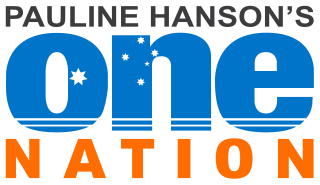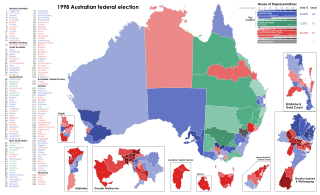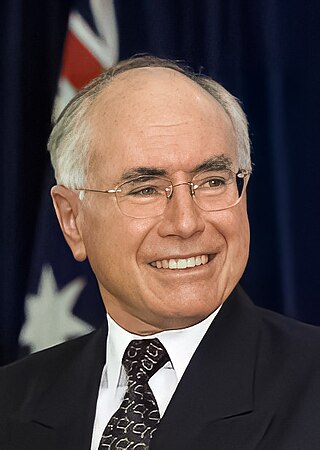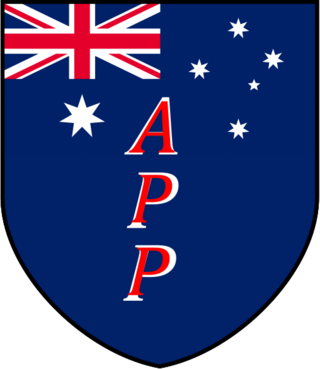
Pauline Hanson's One Nation, also known as One Nation or One Nation Party, is a right-wing populist political party in Australia. It is led by Pauline Hanson.

The 1998 Australian federal election was held to determine the members of the 39th Parliament of Australia. It was held on 3 October 1998. All 148 seats of the House of Representatives and 40 seats of the 76 seat Senate were up for election. The incumbent centre-right Liberal/National Coalition government led by Prime Minister John Howard of the Liberal Party and coalition partner Tim Fischer of the National Party defeated the centre-left Australian Labor Party opposition led by Opposition Leader Kim Beazley, despite losing the nationwide popular and two-party preferred vote. However, the Australian Labor Party gained seats compared to the previous election.

The 2004 Australian federal election was held in Australia on 9 October 2004. All 150 seats in the House of Representatives and 40 seats in the 76-member Senate were up for election. The incumbent Liberal Party of Australia led by Prime Minister of Australia John Howard and coalition partner the National Party of Australia led by John Anderson defeated the opposition Australian Labor Party led by Mark Latham.

The Australia First Party (AFP), officially known as the Australia First Party (NSW) Incorporated, is an Australian nationalist political party founded in 1996 by Graeme Campbell, a former member of the Australian Labor Party. The policies of the party have been described as nationalist, anti-multicultural and economically protectionist, advocating for strict immigration controls, the prioritization of Australian citizens in employment, and the promotion of Australian culture and values. The party's logo includes the Southern Cross of the Eureka Flag.

The Family First Party was a conservative political party in Australia which existed from 2002 to 2017. It was founded in South Australia where it enjoyed its greatest electoral support. Since the demise of the Australian Conservatives into which it merged, it has been refounded in that state as the Family First Party (2021), where it contested the state election in 2022, but failed to win a seat.
The Australian League of Rights is a far-right and antisemitic political organisation in Australia. It was founded in Adelaide, South Australia, by Eric Butler in 1946, and organised nationally in 1960. It inspired groups like the Canadian League of Rights (1968), the New Zealand League of Rights (1970) and the British League of Rights (1971), with principles based on the economic theory of Social credit expounded by C. H. Douglas. The League describes itself as upholding the virtues of freedom, with stated values of "loyalty to God, Queen and Country".

The Division of Kalgoorlie was an Australian electoral division in the state of Western Australia, named after the city of Kalgoorlie. The Division was proclaimed in 1900 as one of the original 65 divisions to be contested at the first federal election in 1901. In its final form, it covered most of the land area of Western Australia, with a size of 2,295,354 square kilometres (886,241 sq mi)—over 90 percent of the state's landmass. It included the Goldfields-Esperance, Gascoyne, Pilbara and Kimberley regions of Western Australia, in addition to the eastern and far northern parts of the Mid West region, and the town of Merredin. It was the largest single-member electorate by area in the world—almost a third of the continent.

David Albert Lloyd Johnston is an Australian politician who was a Liberal Party member of the Australian Senate from 2002 to 2016, representing the state of Western Australia. Johnston was the Minister for Defence from 18 September 2013 to 23 December 2014, when he was replaced by Kevin Andrews.
Australians Against Further Immigration (AAFI) was an Australian far-right political party founded by radiologist Dr. Rodney Spencer and his wife Robyn, the parents of actor Jesse Spencer. The party described itself as "eco-nationalist", was opposed to mass immigration and aimed for zero net migration. The party was founded in 1989, registered in 1990, and ceased to exist in 2008.

In Australian politics, the two-party-preferred vote, commonly referred to as simply preferences, is the result of an election or opinion poll after preferences have been distributed to the two candidates with the highest number of votes who, in some cases, can be independents. For the purposes of TPP, the Liberal/National Coalition is usually considered a single party, with Labor being the other major party. Typically the TPP is expressed as the percentages of votes attracted by each of the two major parties, e.g. "Coalition 50%, Labor 50%", where the values include both primary votes and preferences. The TPP is an indicator of how much swing has been attained/is required to change the result, taking into consideration preferences, which may have a significant effect on the result.

Elections were held in the state of Western Australia on 10 February 2001 to elect all 57 members to the Legislative Assembly and all 34 members to the Legislative Council. The two-term Liberal–National coalition government, led by Premier Richard Court, was defeated by the Labor Party, led by Opposition Leader Dr Geoff Gallop, in a landslide.

The 1974 Australian federal election was held in Australia on 18 May 1974. All 127 seats in the House of Representatives and all 60 seats in the Senate were up for election, due to a double dissolution. The incumbent Labor Party led by Prime Minister Gough Whitlam defeated the opposition Liberal–Country coalition led by Billy Snedden. This marked the first time that a Labor leader won two consecutive elections.

The 2010 Australian federal election was held on Saturday, 21 August 2010 to elect members of the 43rd Parliament of Australia. The incumbent centre-left Australian Labor Party led by Prime Minister Julia Gillard won a second term against the opposition centre-right Liberal Party of Australia led by Opposition Leader Tony Abbott and Coalition partner the National Party of Australia, led by Warren Truss, after Labor formed a minority government with the support of three independent MPs and one Australian Greens MP.
Reclaim Australia: Reduce Immigration (RARI) was a minor Australian political party that was active from 1996 to 1999. The party advocated reducing Immigration to Australia and was associated with the far right of Australian politics. The party was deregistered due to a lack of members, and was largely displaced by the more successful One Nation and, to a lesser extent, Australians Against Further Immigration (AAFI). The party's best electoral result was in the by-election following the retirement of former Prime Minister Paul Keating from the federal seat of Blaxland. In this by-election, the Liberal Party did not field a candidate to oppose the sitting Labor Party, and, although RARI finished behind AAFI on the primary vote, on preferences RARI was able to come second in the seat.

The 1994 Mackellar by-election was held in the Australian electorate of Mackellar in New South Wales on 26 March 1994. The by-election was triggered by the resignation of the sitting member, the Liberal Party of Australia's Jim Carlton on 14 January 1994. The writ for the by-election was issued on 18 February 1994. On the same day a by-election was held in Warringah.
Anthony James Fels is a former Australian member of parliament and perennial candidate for public office. He was a member of the Western Australian Legislative Council representing the Agricultural Region from 2005 to 2009, representing the Liberal Party (2005–2008) and later the Family First Party (2008–2009).

The 2013 Western Australian state election was held on Saturday 9 March 2013 to elect 59 members to the Legislative Assembly and 36 members to the Legislative Council.
Cedric Wyatt was an Australian public servant and Indigenous rights advocate. A cousin of Ken Wyatt and the father of Ben Wyatt, both elected politicians, Wyatt worked in senior positions for Western Australia's Public Sector Commission and the federal Australian Public Service.

The Australian Protectionist Party(APP) is a minor nationalist political party in Australia. The party stated that it had been formed to fill the void of a pro-Australian party within the political arena based on traditional values.

The 2025 Australian federal election will be held on or before 17 May 2025 to elect members of the 48th Parliament of Australia. 150 seats in the House of Representatives and likely 40 of the 76 seats in the Senate will be contested. It is expected that at this election, the Labor government of Prime Minister Anthony Albanese will be seeking re-election to a second term in office, opposed by the Liberal/National Coalition under Leader of the Opposition Peter Dutton, minor parties such as the Greens, and independents.















